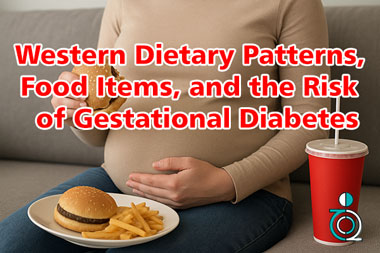
2025-11-14
Western Dietary Patterns, Food Items, and the Risk of Gestational Diabetes
Prospective cohort studies are a type of observational study in which researchers select a group of individuals at present and follow them for a specific period to examine the relationship between exposure to a factor (such as dietary habits) and the occurrence of an outcome (such as gestational diabetes).
This systematic review and meta-analysis examined the association between Western dietary patterns and certain common foods in Western diets with the risk of gestational diabetes mellitus (GDM). The analysis was based on 21 prospective cohort studies including a total of 191,589 participants and 12,331 cases of GDM. These studies were conducted in several countries, including the United States, China, European countries, Australia, Singapore, and Iran.
Gestational diabetes is a major public health concern that causes short- and long-term complications for both mother and infant. Its occurrence is influenced by genetic and lifestyle factors. The Western dietary pattern (characterized by high consumption of red and processed meat, refined grains, sweets, fried foods, and fast food) is associated with metabolic diseases such as type 2 diabetes; therefore, examining its role in increasing GDM risk is important.
The results showed that women who adhered most strongly to the Western dietary pattern before pregnancy in Western and European countries had a higher risk of developing GDM. Although the overall result for the Western dietary pattern alone was not statistically significant, subgroup analyses (in higher-quality studies, larger sample sizes, and assessments of pre-pregnancy diet) demonstrated a significant association.
Analysis of specific foods showed that potato consumption had no overall significant association with GDM; however, in higher-quality studies, a potential increased risk was observed (likely due to differences in cooking methods, such as fried vs. boiled potatoes). Fast-food consumption was consistently and significantly associated with increased GDM risk.
Animal meat consumption was one of the most important factors. High intake of meat (especially red and processed meat) significantly increased the risk of GDM. In contrast, consumption of poultry and fish was not associated with increased risk and may even have a protective effect.
Several biological mechanisms may explain this increased risk. Red and processed meats contain high levels of saturated fat, cholesterol, heme iron, and compounds such as nitrosamines that can increase inflammation, oxidative stress, and insulin resistance. Fast foods often contain trans fats and high-heat–generated compounds (such as AGEs and acrylamide) that disrupt insulin signaling and reduce glucose tolerance.
This study benefits from a large sample size, prospective design, and adjustment for confounding factors. However, there are limitations: dietary assessment tools may have errors, some studies had lower quality, and due to the observational nature of the studies, causality cannot be proven.
Overall, this meta-analysis indicates that the Western dietary pattern (particularly high consumption of red and processed meat and fast food) increases the risk of GDM, especially when consumed before pregnancy. In contrast, poultry and fish do not increase risk. These findings suggest that promoting healthy dietary patterns among women of reproductive age may help reduce the incidence of gestational diabetes.
Compiled by: Parimah Khosousi / Food Industry Engineer
/End of message
Charity Foundation of Special Disease
@cffsd